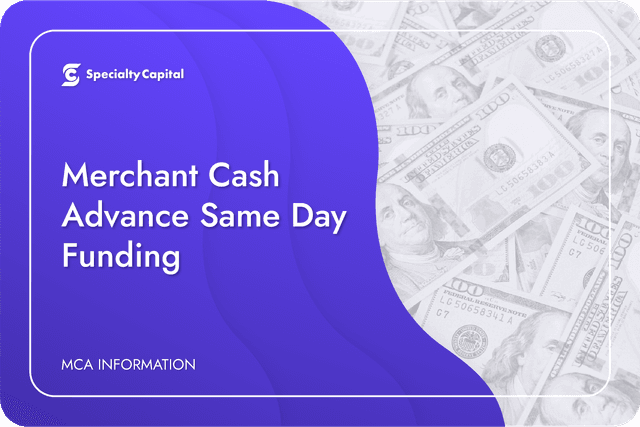Merchant cash advances, or MCAs, can be a convenient financing option for small businesses that need capital to grow their business. However, if things don’t go as planned – what happens to your business? In this guide, we’ll explore exactly what happens if you default on a merchant cash advance, some of the possible repercussions, and some tactics and tips to consider when dealing with this setback.
If you’ve secured financing for your business with a merchant cash advance, you should have a detailed agreement that explains your relationship and how your financing is paid back. By missing one or more of your remittance obligations, your funder has several options to recoup their missing money from your business. Here are some of the most common.
One of the first steps your funder may take is to freeze your business credit. This limits your ability to qualify for additional financing from other financial institutions, putting a hold on your business’s finances. In addition to new credit opportunities, a credit freeze can also put a hold on existing lines of credit that you can draw from such as a business line of credit or business credit card. The length of your credit freeze will depend on how quickly you can resolve your debt or reach an agreement with your MCA funder so it’s important to address the issue swiftly.
Next, your funder may choose to place a lien on your business. A UCC, or Uniform Commercial Code, lien is a public declaration that your funder has a right to possess or claim assets of your business until the debt is paid off. This means that if your business owns valuable equipment, inventory, or other assets, these can be earmarked as collateral against the MCA.
Having a lien against your business can severely impact your ability to sell your business assets or secure future financing as it signals to other creditors that your business is already facing MCA debt.
In more severe cases, your funder may file a lawsuit against your business in court. This legal action is usually the last resort and indicates that negotiations have failed or that the amount owed is significant enough to warrant a lawsuit.
If the court rules in favor of the funder, you might be obligated to pay the outstanding advance in addition to legal fees, and any other costs incurred by the funder during the lawsuit. Oftentimes, this can lead to bankruptcy and closure of your business because the additional costs incurred can be substantial.
Merchant cash advance agreements will detail your total remittance amount, the factor rate of your financing, your monthly remittance percentage, as well as the default conditions and funder‘s recourse.
These terms should be closely analyzed before signing your agreement as they will illustrate the exact details of what happens if you default on your financing. If the terms are too restrictive for your liking, you might consider other small business financing options.
Depending on your MCA agreement, you may have consented to a personal guarantee. This commitment will make you liable for any debts that your business fails to repay.
If you default on your MCA, your personal assets including your savings, residences, or other valuable possessions can be at stake. For this reason, if you’ve committed to a personal guarantee, it’s critical to avoid defaulting on your financing to protect your individual assets.
Your best option when handling a merchant cash advance default is to first try negotiating with your funder. You may be surprised how willing they might be to work with you. After all, it’s in their best interest for your business to succeed so your funder can recoup their investment.
Some funders may be willing to temporarily reduce your payments, lower the percentage of your card sales paid toward your financing, or even offer a grace period where no remittance is required.
While this is going to increase the costs of your financing and can potentially cause a “cycle of debt” – it might be your only option to get back on track and repay your debt.
Another option worth considering is consolidating or restructuring your debt. If you have multiple debts beyond your merchant cash advance, you may be able to consolidate them into one loan with a lower rate and more favorable terms. Debt consolidation is oftentimes more costly in the long run but it can be a great tool that solves short-term cash flow hurdles.
Restructuring your debt is another choice that can help improve your business’s cash flow. Instead of combining all of your debts together, this allows you to renegotiate the terms of your agreement with the funder which can be more manageable for your business.
If your business is facing a financial setback, it’s critical to analyze your business’s financials and create a plan to repay your debt. While these decisions can be difficult to make, you may be forced to eliminate staff, reduce marketing spend, or cut non-revenue-generating expenses to improve your business’s cash flow and reach your goals.
Additionally, if your business already operates as lean as possible, you may be forced to look for new revenue streams you can use to increase your top line.
Finally, having a contingency plan and an emergency fund for your business’s finances can be advantageous to help you maneuver through financial challenges and economic downturns.
If you default on an MCA and your funder is pursuing legal action, consulting with a lawyer is always a wise decision. They can help to guide you through the process, explaining your rights and options as well as negotiating with your funder to reach a possible settlement that benefits both parties. An experienced lawyer can also help defend your actions in court and possibly reduce the amount owed once a ruling is made.
If you default on a merchant cash advance, your funder has a few options they may pursue. First, they will likely put a freeze on your credit which disables your ability to find financing elsewhere. Second, they may put a lien on your assets that they are entitled to, which can cause further dilemmas in your business. Finally, your MCA funder might pursue legal action in the form of a lawsuit to recover their funds. This can be a cumbersome and costly process that is usually a last resort option.
Your best option when faced with a possible default is to work with your funder to see if they have any options that can help you get back on track with your financing. If your negotiations fail and legal action is taken, always consult legal counsel to protect yourself and your assets.

Merchant Cash Advance for Small Businesses (Benefits & Requirements)
When small businesses need financing, they have a range of financing options to choose from. But many opt for a merchant cash advance (MCA) because...

Merchant Cash Advance Same Day Funding
A merchant cash advance (MCA) is a great financing option when you need same-day funding, but there are certain requirements, restrictions, and dra...

How to Get out of a Merchant Cash Advance
A merchant cash advance (MCA) can be great when you need short-term financing that’s easy to secure, but what happens if you want to get out of an ...